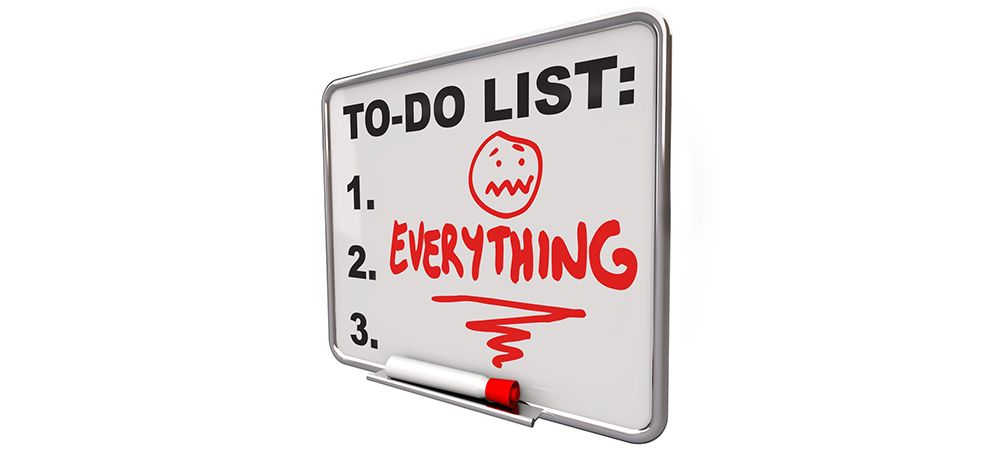
Burnout is the type of extreme stress or fatigue that can lead to everything from respiratory problems to gastrointestinal issues and is officially recognized as a mental health concern. According to WHO (World Health Organization), “burnout is characterized by feelings of energy depletion or exhaustion; increased mental distance from one’s job, or feelings of negativism or cynicism related to one’s job and reduced professional efficacy.”
Burnout is defined as a state of emotional, physical and mental exhaustion caused by excessive and prolonged stress. It happens when you feel overwhelmed and emotionally drained and unable to meet constant demands. While burnout can occur in any area of our lives and any profession, much of the burnout research focuses on work related situations.
Symptoms
Some symptoms that you may experience may show up as signs of physical, mental and/or emotional health as a result of stress related to a job or workplace.
- Reduced performance and productivity
- Anxiety
- Low mood and difficulty concentrating
- People tend to emotionally distance themselves
- Feel numb about their work
- Lowered immunity, frequent illnesses
- Frequent muscle pain
- Change in appetite or sleep habits
- Feeling tired and drained most of the time
- Feeling helpless, trapped and defeated
- Loss of motivation
- Increasingly negative outlook
- Decreased satisfaction and sense of accomplishment

Causes
Although burnout can occur in any field or occupation, it usually happens amongst people in the caring professions of medicine, nursing, social work, counseling and teaching.
Workload: When you are chronically overloaded and do not have an opportunity to rest and recover and have a never ending, insurmountable amount of tasks. When your work becomes too urgent and too complex for your capabilities.
Insufficient Reward: Your feelings towards your job make you feel not recognized, taken for granted and underpaid.
Unfairness: You and others are treated unfairly and there is a culture of favoritism and promotions and bonuses are made behind closed doors. According to one Harvard Business Review article, when employees are told what is really happening at their company versus when no information is offered and nothing shuts down morale than whispering behind closed doors.
Lack of Control: Your sense of control over your responsibilities is limited and you do not have a say in the events around you.
Values mismatch: When the employee highly values something and the company does not, the employee’s motivation to keep working hard and persevere through hardships significantly drops. Ideals and values are an integral part of employees’ motivations .
Community: There are no resolutions and problem solving between colleagues and co-workers. Working with patronizing team mates and a lack of feedback.

Treatment
What are some things you can do to help prevent or deal with burnout? It is tricky when we are emotionally and physically drained and are burned out or on the road to a burnout, our situation may seem hopeless and overwhelming and seems difficult to overcome.
Reach out to friends and family: Do not be afraid to get help or reach out to others for support as it may be the most effective way to help you get back on your feet. Speaking to others face to face with a great listener is one of the quickest and most powerful ways to help calm your nerves and lower your tension and stress levels. A good listener does not have to have the capability to make your problem go away but just to be there for you to listen and not judge you. Call on for help from your family and loved ones and confide in them with your situation and get help and advice from them.
Exercise: Builds up your mental and physical health to become more resilient and stronger and able to withstand mental and physical stress. It also lowers stress, anxiety levels and muscle tension.
Diet: Eat a well balanced diet that includes less sugar and refined carbohydrates to avoid crashes in energy and keep your energy levels steady. Avoid use of nicotine, limit alcohol and try to use it in moderation as it is a temporary fix for anxiety and does not possess a lasting effect.
Join a cause or a community group that has the most meaning to you: The most effective way and support maybe by connecting with a religious, social or support group that provides an environment where you can be yourself, not judged and supported to help you deal with stress, anxiety and treating or preventing a burnout.
Find a balance in your life: When you dislike your job and environment, look for meaning and joy then focus on the parts of your life that bring you that, such as hobbies, family, friends or activities in the community.
Connect with people at work: Developing a strong connection at work with colleagues can help lower and battle the effects of burnout. Having someone to talk to at work can help relieve stress, anxiety, improve job performance and help get you through the day.
Take a vacation: Try to go on a vacation or take sick days to remove yourself from the job and take time to recharge mentally and physically.
Sleep: Get plenty of sleep and make it a priority because lack of sleep can drain you more and worsen a burnout.
Relaxation: Dedicate time to relax, find techniques that relax your body and mind and that help you unwind and enhance the body’s relaxation response.
Learn how to reduce stress when it happens instantly and develop techniques to help you lower it in its tracks. Try to deal with troublesome feelings and thoughts and encourage yourself to relieve stress to prevent a burnout. Try to find meaning and joy in your job to increase your overall health and happiness.
Conclusion and Recommendations
It is always important to evaluate our work lives and mental health in correlation to our jobs. Watch out for factors that predispose you to burnout and always analyze your physical and mental health. Most people have many days where they feel overloaded, unappreciated and have to push themselves to get out of bed but if you feel like this most of the time, you may be burned out.
The process of burnout is a gradual process and does not happen in one day and the signs and symptoms can be subdued at first but gets worse with time. Consider the early symptoms as warnings and something may be wrong and given attention to. Paying attention and being aware of the warnings and symptoms and playing an active role in your mental health can possibly prevent a major burnout.



